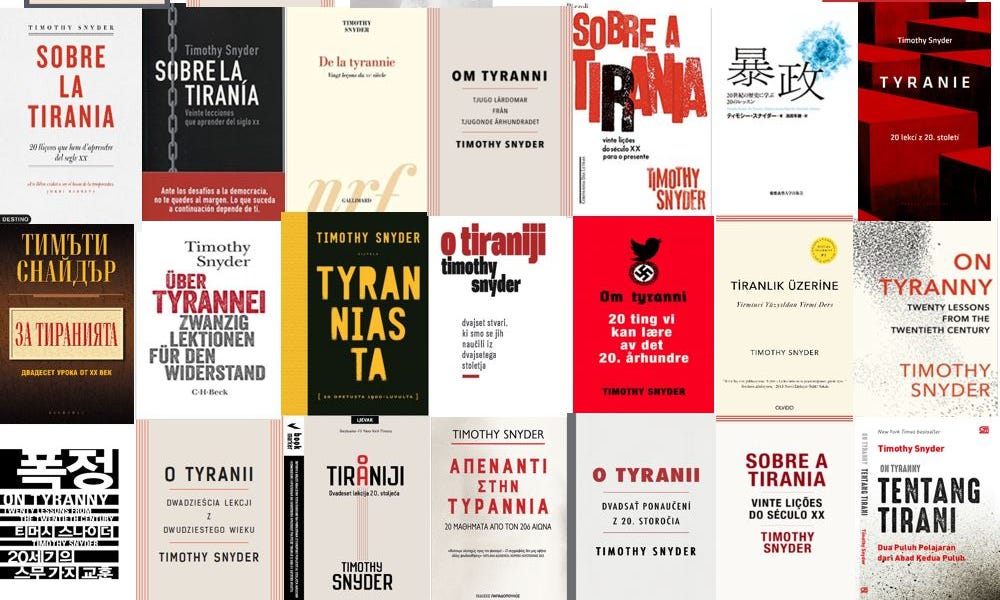How to break the spell of the status quo
Plus some good news from Europe and a new in-depth profile of stuff our modern world runs on (#513)
This is David, your personal guide to the web, and you're reading the Weekly Filet, the newsletter for curious minds who love when something makes them go «Huh, I never thought of it this way!». As every Friday, I have some recommendations for you, to make sense of what’s happening, and imagine what could be. It's great to have you.
1. Twenty Lessons On Tyranny
Only 207 more weeks to go. Trump's inauguration – and the realisation of how normalised his outrageous words and actions have become – seems like a good time to spotlight Timothy Snyder's twenty lessons on tyranny again. «Do not obey in advance.» is the big one, but the most empowering is probably this one: «The moment you set an example, the spell of the status quo is broken, and others will follow.» (as exhibited by Mariann Budde)

2. EU’s solar and wind growth pushes fossil-fuel power to lowest level in 40 years
Some good news from Europe. Solar has, for the first time, overtaken coal as power source in the EU. And overall, renewables now generate way more power than fossil fuels. Sadly, all gains made by Europe will be dwarfed by the additional emissions Trump's policies are expected to generate.

3. The Forgotten Woman Who Transformed Forensics
The rape kit, a standardised way to collect evidence of sexual assault, was a game changer when it was introduced in the 1970s. A man is often credited with inventing it – this is the story of the woman who actually invented it. «In a cruel irony, a woman who drove major social change failed to get her due as a result of politics and sexism.»

4. The Anti-Social Century
Thought-provoking longread on how more and more people opt to spend more time alone, and how this is rewiring an entire society's identity. Most changes are marginal. However, «the way we spend our minutes is the way we spend our decades.»

5. The text file that runs the internet
A new addition to my collection of in-depth profiles of the stuff our modern world runs on. If you own a website – be it the Weekly Filet, The New York Times or Wikipedia – a simple text file called robots.txt is your best option to tell the most powerful tech companies in the world what they can and cannot do with your content. Invented three decades ago, by people «who believed that the internet was a good place, filled with good people, who above all wanted the internet to be a good thing.»


What else?
Instant-gratification links that make you go wow! or aha! the moment you click.
- Madame President – the New Yorker cover that could have been.
- Headline of the week: I knew one day I’d have to watch powerful men burn the world down – I just didn’t expect them to be such losers.
- The Australian Open is streaming all matches live, but since it has obviously sold TV rights, it uses animated avatars for the players. Impressive technology with some entertaining glitches.
- This man has taken a selfie every day since 2000.
- Mad respect to Matt Kiser for running «WTF just happened today?» uninterrupted since the first day of Trump's first term.
- A humble request for the arc of the moral universe.

Books for curious minds
Some new ones as I read them, some older ones that continue to inform how I look at the world and myself. More on my digital bookshelf.

From the mechanics to the magical — a portrait of the heart as the fragile engine of life. Buy it here.

A gem from the archive

The Weekly Filet archive offers more than 2500 hand-picked links since 2011, like this one. You can search by interests, explore collections, shuffle for a gem or check out my all-time favs.
That's it for this week. Thanks for reading. I wish you a nice weekend and hope to see you again next Friday!
— David







